Attorneys for the family of George Floyd sued the city of Minneapolis and the four officers involved in his death Wednesday, vowing to send a message that the police training and practices that target Black people and led to his killing must no longer be tolerated in the United States.
“This is a teachable moment for America,” said attorney Ben Crump, standing outside the U.S. Courthouse in downtown Minneapolis.
While not specifying how much the family will demand in compensation, Crump said, “This is an unprecedented case, and with this lawsuit we seek to set a precedent that makes it financially prohibitive for police to wrongfully kill marginalized people — especially Black people — in the future.”
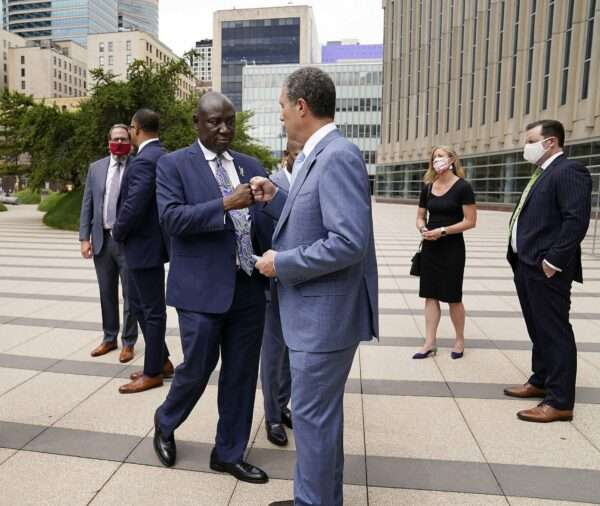
Attorney Ben Crump, who represents George Floyd’s family, announces in a news conference that the family of Floyd is suing the city of Minneapolis and the four officers involved in his death, citing a failure in proper police training and a racist departmental culture that led to a “reckless disregard” of Floyd’s civil rights Wednesday, July 15, 2020, outside the U.S. Federal Courthouse in Minneapolis. Here, Crump bumps fists with co-counsel Antonio Romanucci following the news conference. (David Joles/Minneapolis Star Tribune/TNS)
Crump said that how the city leaders react to the demands put forth by the Floyd family lawyers will have consequences. “Their political legacy will be defined by how they respond,” he said.
City Attorney Erik Nilsson said in a statement that “George Floyd’s death is a tragedy. The city is reviewing the lawsuit filed by his family and will be responding to it. Criminal charges are pending against four Minneapolis police officers, and it’s very important that the criminal case proceed without interference.”
A spokesman for the Police Officers’ Federation of Minneapolis said the union is declining to comment about the lawsuit.
Attorney Ben Crump, who represents George Floyd’s family, announced in a press conference that the family of Floyd is suing the city of Minneapolis and the four officers involved in his death, citing a failure in proper police training and a racist departmental culture that led to a “reckless disregard” of Floyd’s civil rights Wednesday outside the U.S. Federal Courthouse in Minneapolis. Here, Crump is seen at the podium surrounded by his team of lawyers.
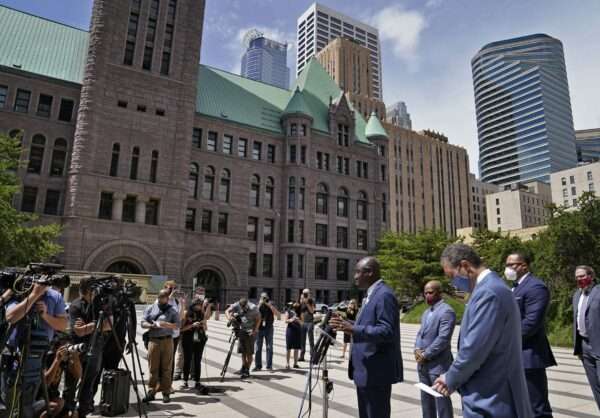
Attorney Ben Crump, who represents George Floyd’s family, announces in a news conference that the family of Floyd is suing the city of Minneapolis and the four officers involved in his death, citing a failure in proper police training and a racist departmental culture that led to a “reckless disregard” of Floyd’s civil rights Wednesday, July 15, 2020, outside the U.S. Federal Courthouse in Minneapolis. Here, Crump is seen at the podium surrounded by his team of lawyers. (David Joles/Minneapolis Star Tribune/TNS)
Floyd, who was Black, died May 25 after officer Derek Chauvin, pinned his knee against Floyd’s neck for nearly eight minutes as Floyd, who was handcuffed, cried out that he couldn’t breathe while bystanders pleaded with Chauvin to stop.
Chauvin is charged with second-degree murder, third-degree murder and manslaughter. Three other officers at the scene — Tou Thao, Thomas Lane and J. Alexander Kueng — are charged with aiding and abetting both second-degree murder and manslaughter. All have been fired.
The federal suit accuses the officers of a “reckless disregard” of Floyd’s civil rights.
“This complaint shows what we have said all along, that Mr. Floyd died because the weight of the entire Minneapolis Police Department was on his neck,” Crump said in a statement. “The city of Minneapolis has a history of policies, procedures and deliberate indifference that violates the rights of arrestees, particularly Black men, and highlights the need for officer training and discipline.”
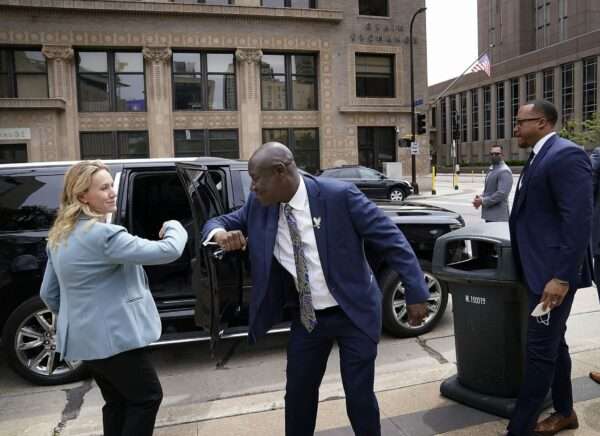
Attorney Ben Crump, who represents George Floyd’s family, announces in a news conference that the family of Floyd is suing the city of Minneapolis and the four officers involved in his death, citing a failure in proper police training and a racist departmental culture that led to a “reckless disregard” of Floyd’s civil rights Wednesday, July 15, 2020, outside the U.S. Federal Courthouse in Minneapolis. Here, Crump, middle, gets an elbow bump from a member of his legal team representing the Floyd family. (David Joles/Minneapolis Star Tribune/TNS)
The suit contends that the officers used deadly force in non-deadly circumstances.
It also alleges that the department engaged in a culture of “warrior-style” or “killology” training, failed to terminate dangerous officers and fostered a culture of racism, leading to a violation of Floyd’s civil rights.
In April 2019, Mayor Jacob Frey announced he was banning officers from receiving “fear-based” training. In defiance of the mayor, the police union quickly countered that it was partnering with a national police organization to offer free “warrior-style” training for any officer who wants it.
On Tuesday, the police department said it is changing its use-of-force policy to encourage officers to try to de-escalate intense situations and hold them accountable when force or weapons are used. Officers will now be required to document in each report they submit how they tried to de-escalate situations. They also must report why they decided to use force and explain why they chose a specific level of force.
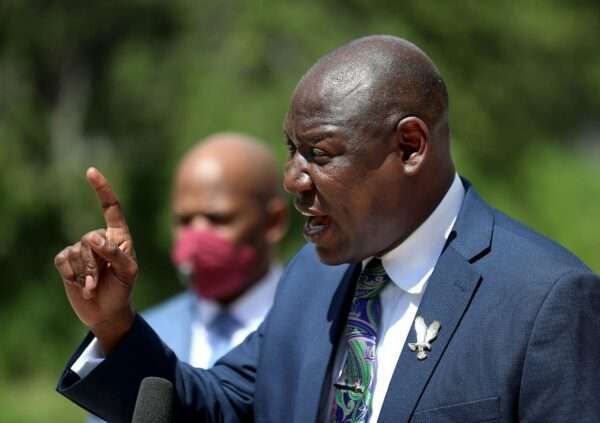
Attorney Ben Crump, who represents George Floyd’s family, announces in a news conference that the family of Floyd is suing the city of Minneapolis and the four officers involved in his death, citing a failure in proper police training and a racist departmental culture that led to a “reckless disregard” of Floyd’s civil rights Wednesday, July 15, 2020, outside the U.S. Federal Courthouse in Minneapolis. Here, Crump is seen at the podium surrounded by his team of lawyers. (David Joles/Minneapolis Star Tribune/TNS)
The suit lists other litigation over allegations of police brutality by Minneapolis officers, and cites the 2010 death of David Smith, who was killed by two Minneapolis police officers at the downtown YMCA when they subdued him by placing a knee on his back for more than four minutes. That death was ruled a homicide by the Medical Examiner’s office, and his family settled the case for $3 million. Jeff Storms, one of the Minneapolis attorneys in that case, is now one of the lawyers representing the Floyd family.
“The Floyd family deserves justice for the inhumane way in which officers with the Minneapolis Police Department killed Mr. Floyd,” said attorney L. Chris Stewart, who is also working on the case. “The city has a responsibility to acknowledge the history and practices of excessive force and impunity with its police force, as well as shortfalls in officer training and discipline.”
Said Stewart: “He was literally tortured to death.”
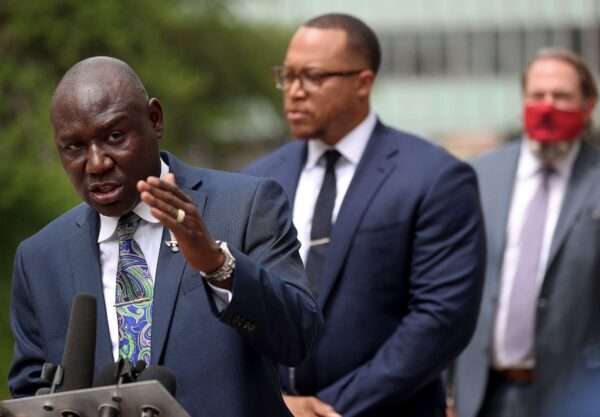
Attorney Ben Crump, who represents George Floyd’s family, announces in a news conference that the family of Floyd is suing the city of Minneapolis and the four officers involved in his death, citing a failure in proper police training and a racist departmental culture that led to a “reckless disregard” of Floyd’s civil rights Wednesday, July 15, 2020, outside the U.S. Federal Courthouse in Minneapolis. Here, Crump is seen at the podium surrounded by his team of lawyers. (David Joles/Minneapolis Star Tribune/TNS)
The 40-page lawsuit recounts how officers Lane and Kueng were dispatched to Cup Foods corner store at 38th and Chicago at 8 p.m. on May 25 in response to a call that Floyd had engaged in potential fraud, “a nonviolent offense,” for allegedly trying to pass a phony $20 bill.
The suit say Floyd was unarmed and did not resist, but was handcuffed. Chauvin and Kueng arrived and after Floyd said he was experiencing claustrophobia, when they tried to put him in a squad car, Lane suggested to the other officers put him in a “maximal restraint technique,” placing him face down on the street with the left side of his face pressed against the pavement.
Lane and Kueng knelt on Floyd’s back and legs, twisted his arms to the side of his body while “Chauvin drove his left knee in the back of Mr. Floyd’s neck.”
Floyd begged the officers to stop, saying “tell my kids I love them. I’m dead” and repeatedly groaning “I can’t breathe,” the suit said. The officers held him in the position, even as onlookers said Floyd was bleeding from the nose and begging them to get off him.
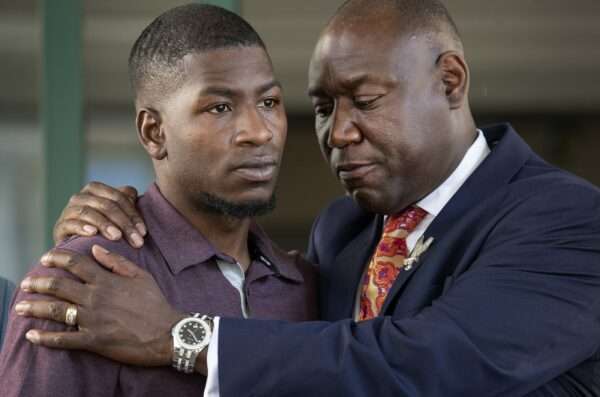
Quincy Mason, left, son of George Floyd, and attorney Benjamin Crump during a news conference in Minneapolis on Wednesday, June 3, 2020. (Carlos Gonzalez/Minneapolis Star Tribune/TNS)
Lane suggested to the other officers that Floyd be rolled onto his side, stating, “I am worried about excited delirium or whatever.” Chauvin responded, “That’s why we have him on his stomach,” which the suit alleges was contrary to national law enforcement best practices. “No officer attempted to move from Mr. Floyd’s body or roll him onto his side,” the suit says.
When an onlooker approached officer Thao and urged him to check Floyd’s pulse, Thao responded, “Don’t do drugs, guys.”
The suit said another onlooker identified as a health care professional with the city’s health department asked officers to check Floyd’s pulse, Thao told her to “get on the sidewalk.”
The suit alleged that Minneapolis Police Department trained officers that a “neck restraint” was an authorized form of non-deadly force and that a “chokehold” was a form of deadly force capable of causing serious bodily injury and/or death. The department trained officers that a proper neck restraint required the officer to “(c)ompress veins, arteries, nerves & muscles of the neck” although adding that serious bodily injury or death can result, the suit said.
The suit also says that since 2012, neck restraints and holds were used by Minneapolis police officers on 428 people, 14% of whom lost consciousness. Training materials offered to officers in 2014, including Chauvin and Thao, depict an officer placing a knee on the neck of an arrestee who is handcuffed in a prone position, the suit said.
It said the department failed to provide officers with proper policy guidance and training on how to observe and attend to the medical needs of arrestees subjected to neck restraints.
The suit contends it has long been known that people placed in a prone position should be on their side as soon as they are secure, but “as of 2012, officers were not provided official training on the dangers of positional or mechanical asphyxia associated with prone restraint” despite the “well-known risk of death.”
The suit singles out police union president Bob Kroll, who it alleges had a “white power” logo on a jacket, encouraged officers to “behave aggressively” and has high influence in the department but has not been disciplined or fired. Kroll has previously denied that he wore such a logo. It also said that Chauvin and Thao had enough complaints on their record that they should have been terminated prior to Floyd’s death.
The suit also said the department “tolerated, permitted failed to correct, promoted or ratified a number of customs, patterns or practices that condoned and required officers to turn a blind eye to and not intervene with the use of excessive force by MPD officers.”
Suits against police officers over wrongful death rarely go to trial in Minnesota as city officials worry that a jury could award even more money than a settlement. Payouts involving police encounters have varied widely in recent years in Minneapolis and a nearby suburb but some have been huge.
In 2019, the excessive-force lawsuit with the family of the Justine Ruszczyk Damond, who was white, was settled for $20 million, the largest amount in the city’s history. An unarmed Damond was shot in the alley behind her southwest Minneapolis home by the now-imprisoned officer, Mohamed Noor.
Also last year, the family of Jamar Clark, a young Black man, who was fatally shot by Minneapolis police in 2015, reached a $200,000 settlement with the city. It came months after the City Council rejected a previous offer as too low.
The mother of Philando Castile, a Black motorist killed by a St. Anthony police officer in 2016, has reached a nearly $3 million settlement with the city that employed the former officer, Jeronimo Yanez, who was acquitted of manslaughter.
___
© 2020 Star Tribune
Distributed by Tribune Content Agency, LLC.



